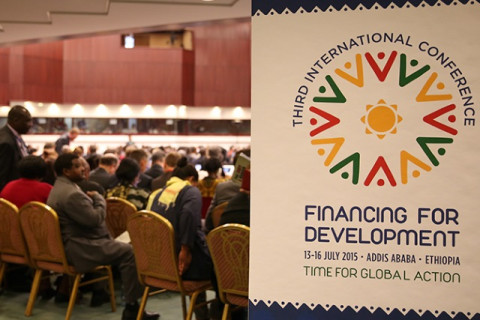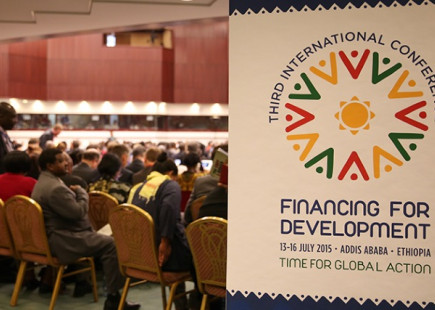Sustainable water without private finance?
Topics
At UN meetings in Addis Ababa, private finance has been touted as key to achieving the new Sustainable Development Goals, but campaigners argue that public finance is more reliable and more likely to secure the human right to water for all.

From Mary Robinson Foundtion (Photo: IISD/ ENB)

From Mary Robinson Foundtion (Photo: IISD/ ENB)
In the Ethiopian capital, delegates from around the world have been meeting to discuss the funding of the SDGs, or the Sustainable Development Goals, which are to be achieved by the year 2030. This requires between three and four trillion euros per year. Many governments, companies, banks and the Organization of Economic Cooperation and Development (OECD) argue that the private sector will have to play a major part in this.
According to the UN report Financing Sustainable Development, there is a preliminary annual 27 billion dollar price-tag attached to the goal to supply the world’s population with water and sanitation. The authors state that the water sector is in need of financial mechanisms that maximise use of private resources. Many social organisations, however, wonder whether private resources provide the most benefit to the population or to the private companies, and whether putting the primary necessities of life – like water – in the hands of the private sector, is a sound decision.
No private finance for the poorBetween 1990 and 2012, two-and-a-half billion people gained access to improved drinking water. This means that the target of the water millennium goal, the precursor to the water SDG, was achieved. However, the same number of people is still without access to sanitation. On top of this, the drinking water of 1.8 billion people is infected with fecal bacteria.
According to the UN, low income countries in Sub Saharan Africa and South Asia face the greatest shortage of water and sanitation in the world. A report of the European Parliament (EP) shows that it is precisely areas such as these that are unprofitable for big business. Private financing primarily benefits more wealthy nations, as there are little profits to be made in the poorer countries. This is why governments, in order to achieve the water SDG, have to stay in charge of a country’s water service and not just hand them over to the private sector.
The EP report confirms that a greater contribution could be made by the private sector. But the authors are critical of viewpoints that consider private and public funds as interchangeable. The report shows that Foreign Direct Investments (FDIs), in other words for profit investments by foreign companies, cannot be a substitute for public investments. Ninety percent of the profits coming out of FDIs would flow back out of the ‘receiving’ country. But even investments by domestic companies do not automatically result in better water facilities. Public investments would be more flexible, more stable and cheaper than volatile business investments that are only meant to increase profits.
When governments lack the sufficient budgets to improve water facilities and sanitation, it is more sensible to borrow money than to leave these services to big business. At the very least, loans must not be conditioned on market-based reforms. This is the argument of public water experts Satoko Kishimoto (TNI) and David Boys (PSI). According to the UN, the world's savings of 16 trillion euros could serve as a safeguard for these loans. In this scenario the government will remain responsible for the water supply to make sure that access to clean drinking water and sanitation either improves or is at least maintained.
Water campaigners Mark Dearn and Meera Karunananthan in the Guardian argue that the large majority of countries have the capacity to offer decent, public services. Even countries with the least water and sanitation facilities could provide access for their entire population within ten years, using less than one percent of their GDP. However, this one percent relies on a progressive taxation system, which would put an end to corruption, illegal cash flows, and foreign companies that evade taxes to this day. Governments that, under these conditions, would still be incapable of providing their populations with their primary needs, would be eligible to receive developmental aid from the international community.
According to Blue Planet Project, the UN-debates in Addis Ababa should not overlook the drawbacks of private finance. Investments by big business are based on investment treaties that leave foreign investors infinitely better protected than a respective country or its population. The controversial ISDS-clause is a prime example of such asymmetric protection, because it gives businesses – fearing they will miss out on future profits – the authority to sue countries outside of their national legal order. So far 608 ISDS lawsuits have been settled in non-transparent and biased tribunals. Dozens of claims are added to the list every year.
From the 1980s onwards, governments started putting their trust in the private sector. Argentina, for instance, signed around fifty investment agreements in the 1990s, entering into eighteen public-private partnerships in order to pay for water services. When, after the 1999-2002 economic crisis, Argentina wished to end nine out of the eighteen water contracts, six out of nine attempts were challenged in the main international investment tribunal, the International Center for Settlement of Investment Disputes (ICSID). Out of all countries, Argentina has been sued by foreign companies the most (55 times): two-thirds of these lawsuits came in response to measures taken by the Argentinian government after the economic crisis.
Since the year 2000, there has been a growing realisation that getting domestic or foreign companies to invest in water facilities and sanitation, does not necessarily result in cleaner and more accessible water services. Between the years 2000 and 2015, 235 local, regional and national governments decided to remunicipalise privatized water companies by annulling contracts and reclaiming ownership of the supplies.
In order to safeguard access to water and sanitation facilities, over a hundred community organisations are struggling to keep water (like education and healthcare) out of the negotiations on private financing of the SDGs. This is because private companies raise water prices without adhering to contractual obligations. When investments in the water network fail to occur and prices increase at a breakneck speed, there is a steep decline in the trust placed in big business meddling in the water supply.
Mysore, a popular tourist city in the South of India is a typical example. In 2008 the municipality of Mysore entered into a public-private partnership in order to outsource its water utilities to the private sector. The existing system was very inefficient, causing almost half of the water to get lost. Because of this, water services were outsourced to Jamshedpur Utilities and Service Company (JUSCO) for a period of six years. JUSCO is part of the Indian steel producer Tata Steel. After the contract had been signed there were some disagreements as to the amount of work JUSCO was expected to put in. More work meant higher expenses, which JUSCO was unwilling to make. The Indian paper Live Mint reported that the contract had been drafted in such a way that JUSCO was not compelled to invest in better facilities.
This meant that the public-private partnership completely failed to provide the investment it had promised . Moreover, the poorest citizens – who before the PPP got free water as they’d had been obliged to give up their land – were now suddenly forced to pay. On average water prices increased at least three times. In May 2015 the government decided not to extend the contract, thereby declaring that water is in fact a public good.
People prefer public serviceIn order to pay for the upcoming SDGs, water, like any other development goal, requires a specific and extensive analysis. It is crucial to pay attention to the drawbacks of corporate investments and public-private partnerships in order to determine whether for-profit participation puts societal interests before private ones.
Moreover, public finance is still a sound alternative to private investment. First, the water SDG could be financed by implementing progressive tax systems, through which governments would receive their rightful revenue. Second, businesses such as banks, could provide fair loans, allowing governments to stay in charge of funding and managing public water and sanitation. The cases of Argentina and Mysore prove that people worldwide prefer public water services.

